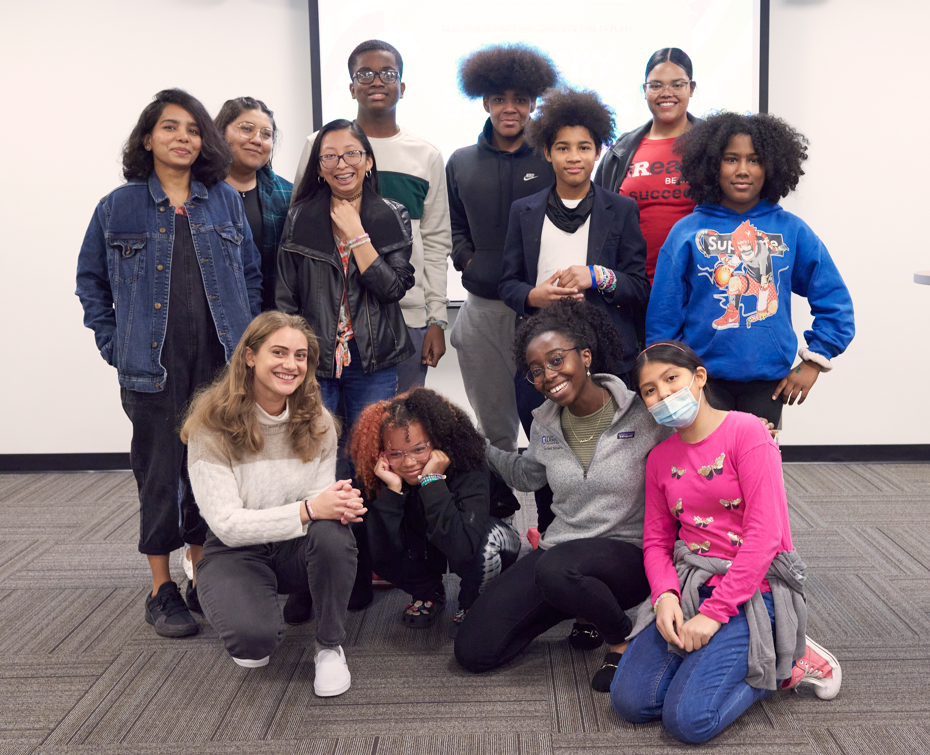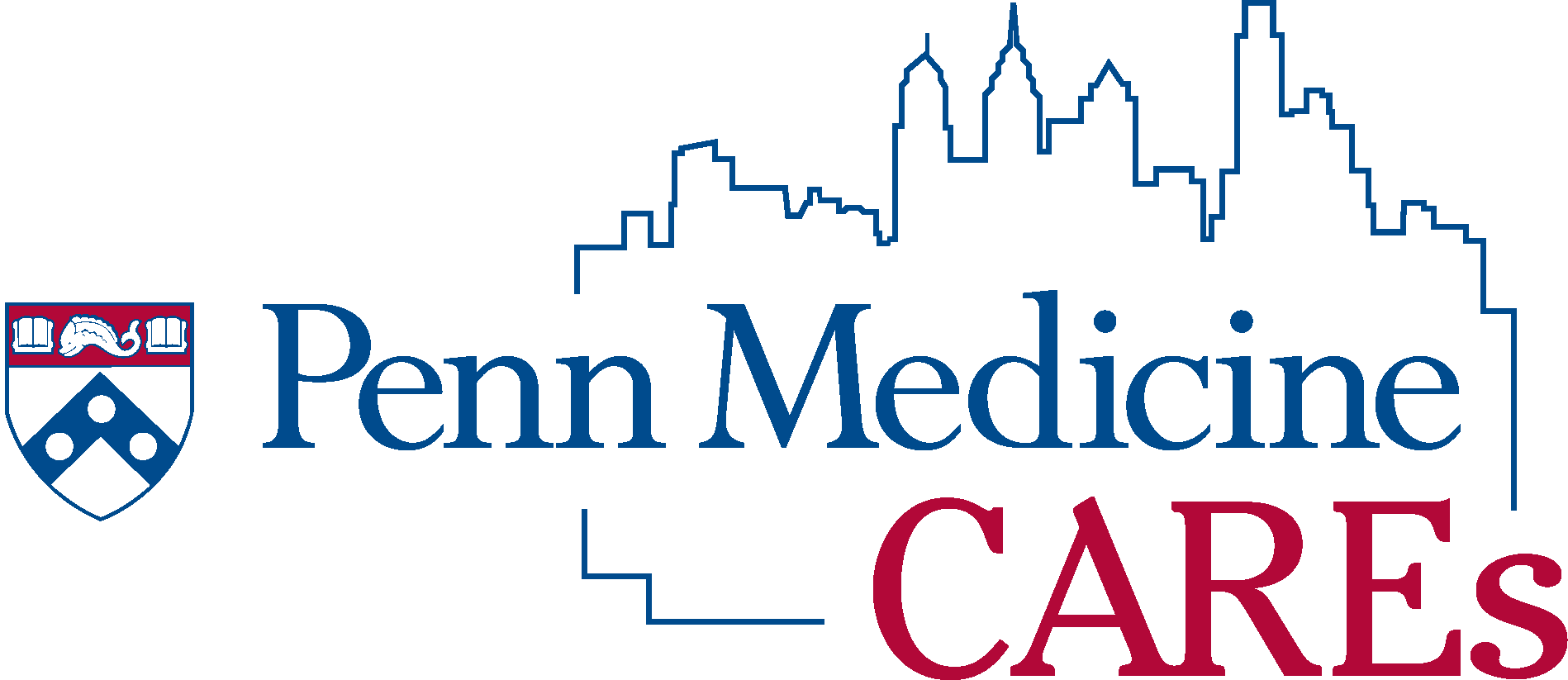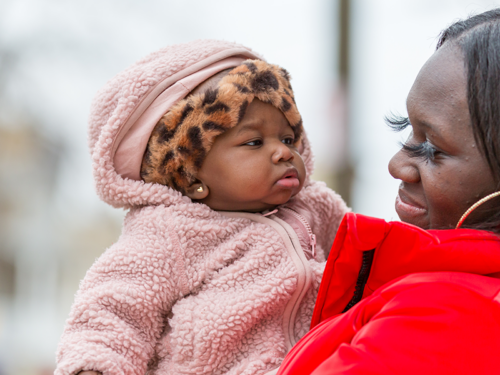

“These bracelets change color when exposed to UV sunlight; that’s when you start getting sunburned,” says Andy, a ninth-grade Rutgers Future Scholar. “I didn’t know I had to use sunscreen every day, every two hours when exposed to the sun.” Andy was participating in a seminar on Skin Health 101 conducted by the nonprofit Give-A-Kit, an organization that serves residents of Camden, New Jersey, and New York City.
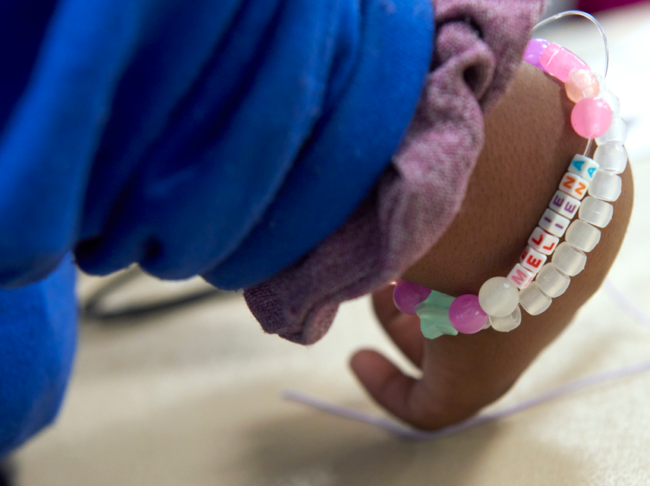
Give-A-Kit founders Liz Ramos — a cell processing technologist in the Center for Advanced Cellular Therapeutics (CACT) in the Perelman School of Medicine at the University of Pennsylvania — and siblings Michel and Joel Ntiri, presented Skin Health 101 over two Saturday mornings this fall. “We see it as a way to give ‘a kit of knowledge’ to Camden students in the Future Scholars program,” says Michel. The five-year Scholars program offers pre-college classes, activities, and cultural events to first-generation, low-income, academically promising students starting in middle school. Those who complete the program receive full tuition funding to attend Rutgers upon high school graduation.
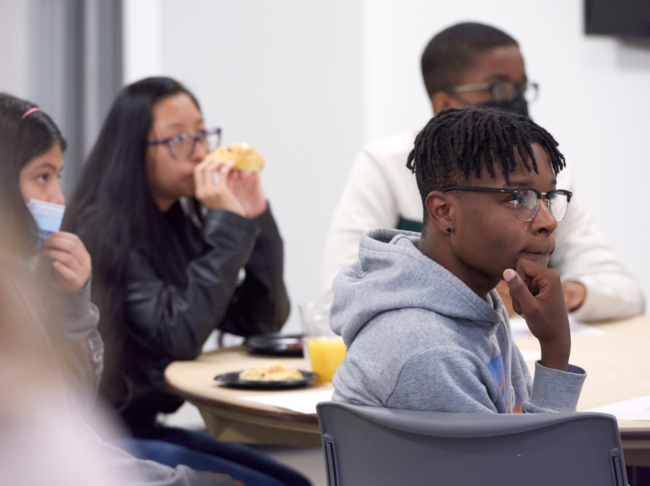
Assisting a City that Struggles
Liz and Michel are no strangers to Camden, where Liz herself grew up. They met as biology majors at Rutgers University–Camden and were both Civic Scholars at the institution, serving to inspire and recruit fellow students to serve Camden residents through local nonprofits. As they served, they saw the disparities between life in the city of Camden and the wealthier communities that surround it. “The simple act of walking to class regularly entailed an encounter with the homeless and impoverished. Some would even approach us asking for spare change or food,” says Liz. “As Civic Scholars, we also often interacted with different schools in Camden and witnessed firsthand the educational gaps in knowledge identified in the students.”
A third of persons living in city of Camden live in poverty, with a per capita income of $16,000, less than half that of the entirety of Camden County, which is $36,559. (By comparison, the highest census tract in Camden County, which includes Haddonfield, has a per capita income of $97,599.) Only 68 percent of city residents over the age of 25 have graduated from high school and only 10 percent have earned a bachelor’s degree. Even though many schools provide tablets or computers, 30 percent of Camden city households lack a broadband internet connection to make those machines useful to students.
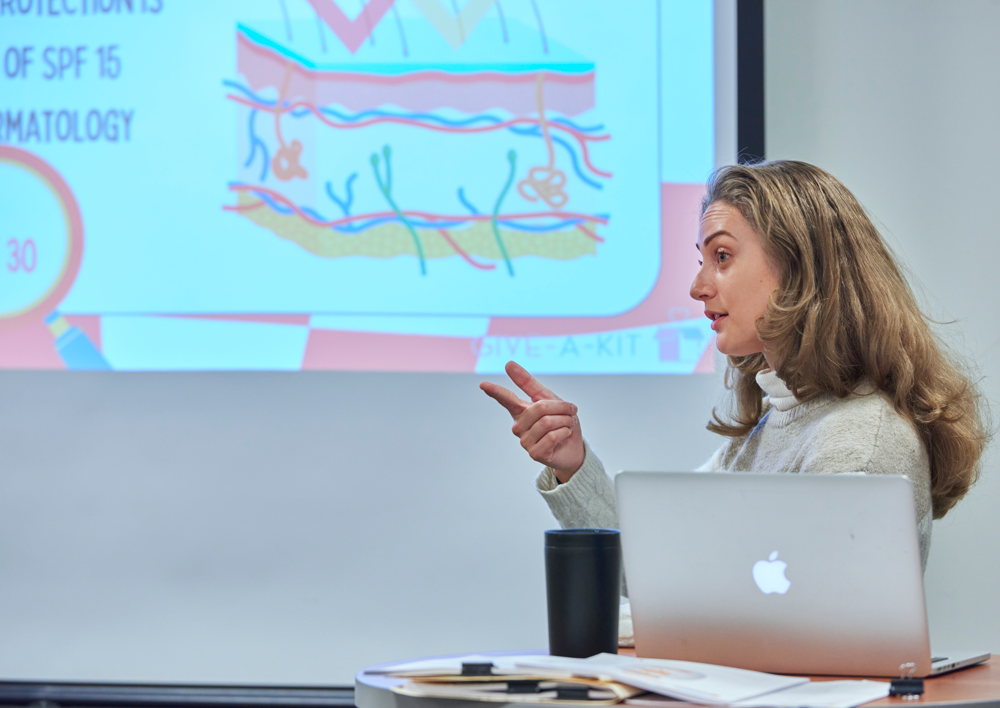
Liz Ramos (pictured above) and Michel Ntiri co-taught Skin Health 101 to Rutgers Future Scholar students in Camden during two sessions this fall.
Whenever possible as college students in Camden, Liz and Michel would purchase food, water, and other basic necessities for the people experiencing homelessness whom they encountered. But they soon realized that, though the recipients were extremely grateful, they could not easily transport the donations to wherever they were living without having it stolen by others or needing to leave some behind. “We saw physical kits as the perfect solution to alleviate the difficulty of traveling from shelter to shelter with their supplies,” says Michel. Conceived during their sophomore year, Give-A-Kit officially launched in 2018.
Give-A-Kit now regularly partners with homeless shelters in Camden and New York, providing drawstring bags containing personal care items to women and children and baby formula to mothers in shelters. Church groups can also request kits that they wish to distribute to a specific population. Larger giveaway events are hosted twice a year. (In 2021, the organization even distributed 1,000 care packages of books and school supplies in the Ntiris’ home country of Ghana.)
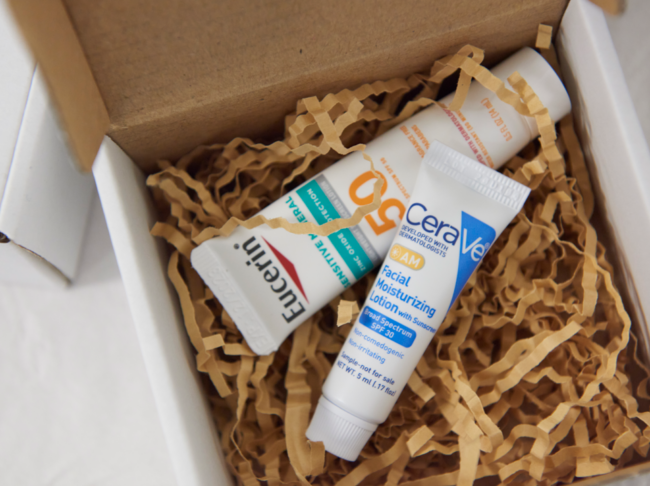
Donations for supplies come from family, friends, coworkers, and people who donate online, including through a monthly donation option. “We also approach companies like Staples, Reckitt (which owns Enfamil), and local businesses that are often willing to donate,” says Liz. To assemble kits, the team partners with volunteers from Rutgers Camden and SUNY Downstate Medical School (where Michel is now a medical student) who graciously donate their time and resources.
Shared Experience Fosters Empathy and Action
Growing up in Camden, Liz attended public and charter schools in the city before earning her bachelor’s degree there at Rutgers. She considers herself one of the lucky ones. “Not everyone growing up in Camden has these opportunities,” Liz says. “As a veteran of the city, I want to give others a leg up. Starting Give-A-Kit was a way to make an impact in kids’ lives.”
The Ntiris, who immigrated from Ghana to New York City, experienced homelessness as children. “Our dad came to America to provide opportunities for his children,” says Michel. “He had been a pilot in Ghana, but he came to America and drove a cab. I remember sleeping in that cab because we couldn’t afford rent. We cycled in and out of homeless shelters. He said education would get us out of there.” Now in medical school, she says, “I want to pay it forward so others have the opportunity to succeed. Knowing how far I’ve come, I’d be remiss not to help others get there.”
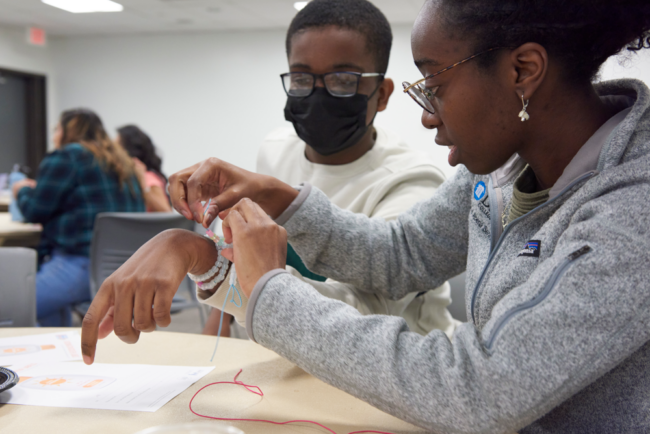
Joel Ntiri, currently a junior at Columbia University, handles Give-A-Kit media and outreach and assists with writing grants and letters to their community partners. “My inspiration for the creation of Give-A-Kit is my upbringing,” he says. “Being raised in the Bronx and witnessing the poverty of my community, I knew I wanted to give back in a special way. Give-A-Kit is the embodiment of these desires.”
For the founders, their Christian faith was a motivating factor for starting Give-A-Kit. They want an organization that not only provides basic necessities but also provides hope for a better tomorrow. They saw the Skin Health 101 program as another way to inspire Camden residents, in this case students, to succeed.
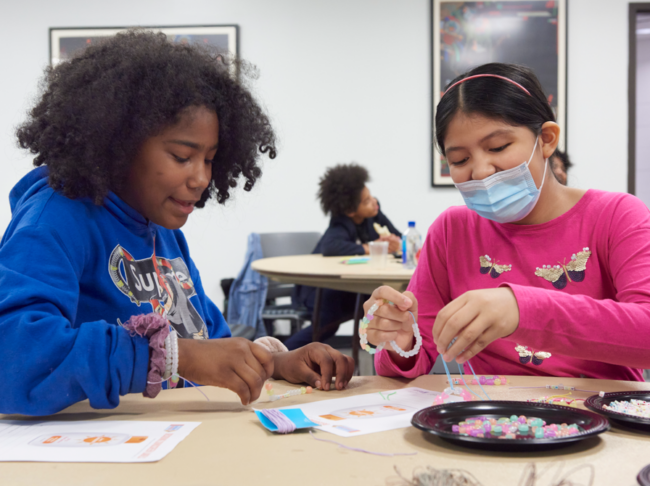
Teaching Teens Positive Skin Care
The Skin Health 101 program was possible because Liz was a Spring 2022 recipient of a Penn Medicine CAREs grant. The CAREs grant, which has been offered by Penn Medicine for more than a decade, supports employee, staff, and student volunteer efforts to help the community outside of work. Give-A-Kit also received a Good Skin Knowledge Grant from the American Academy of Dermatology in support of this program.
The goal of Skin Health 101 was to equip students to care for the largest organ in their body — their skin. The seminars covered skin health and anatomy and teen skin problems like acne. “These past two weeks I learned how acne affects my skin and about a good skincare routine,” says Yari, a ninth grader.
Michel Ntiri, who is currently completing a research year in dermatology at Weill Cornell Medicine, hopes students of color now understand that they may have unique skin issues that differ from their classmates and know they can seek out doctors who are culturally competent, understanding their skin type.
Students were exposed to the science of dermatology and how a dermatologist can help them. “When I was in my teens, I used any product you can get at drug stores,” says Madhu, a Rutgers Future Scholars mentor. “Now the students know what kind of things dermatologists recommend and can ask their parents to take them to a dermatologist.”
“Students with highly melanated skin often believe they don’t need to worry about sunscreen,” says Liz, “but sun damage can occur in any type of skin.” Students crafted their own UV bracelets, like the one Andy described, as a reminder.
Liz and the Ntiris believe the kit of knowledge students received at the Skin Health 101 seminar will impact their future health. “Skin problems often carry a stigma and can result in bullying,” says Liz. “The goal is to catch them when they are young, so when they are faced with skin issues, they know what to do and can explain it to others.”
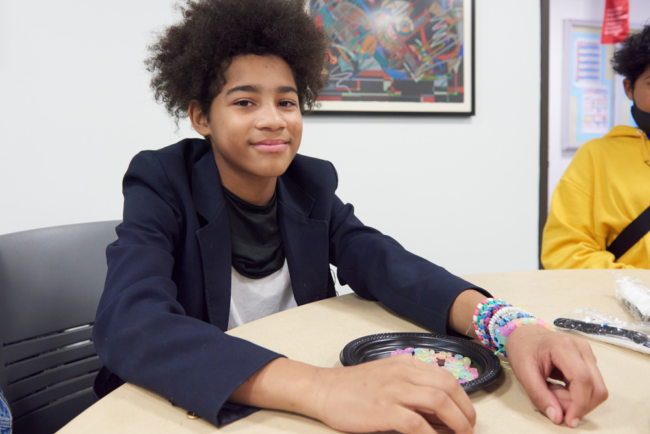
The Give-A-Kit founders also want their own successes to inspire the Future Scholars to succeed in their college journey. “Camden gave us so much — our education, life experiences, opportunities,” says Michel. “We just want to give back to the city that poured so much into us.”
